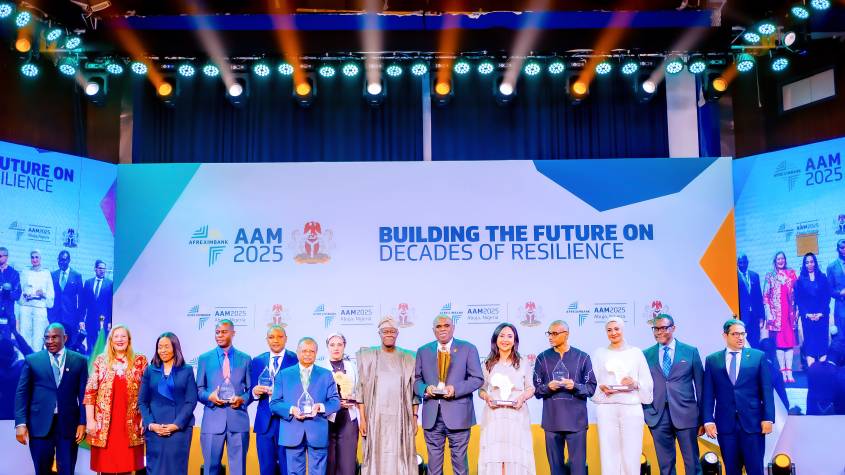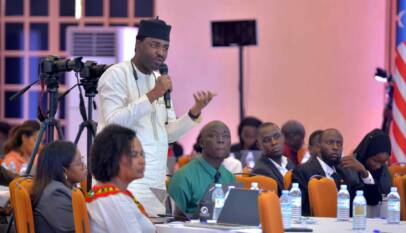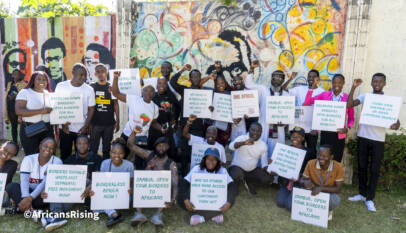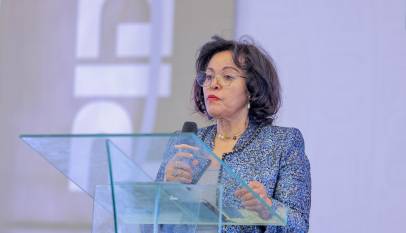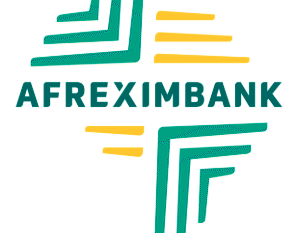Major Highlights of 32nd Afreximbank Annual Meetings
Amid growing global economic fragmentation and geopolitical volatility, the 32nd Annual Meetings of the African Export-Import Bank (Afreximbank), in Abuja, Nigeria, underscored the urgent need for Africa to take charge of its economic destiny.
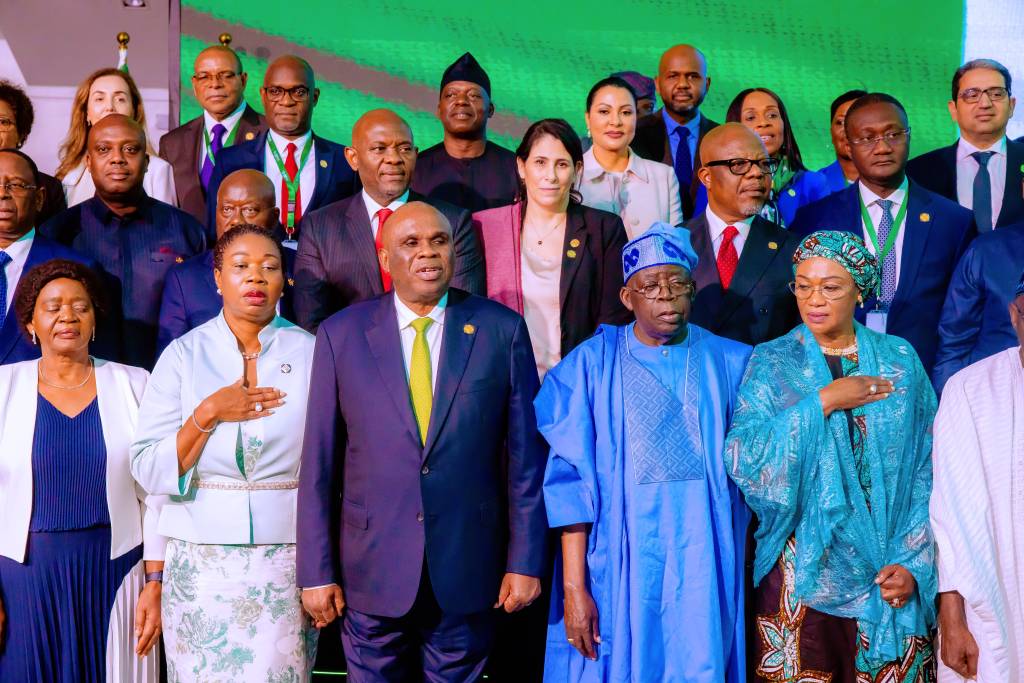
Held from June 25 to 28, 2025, under the theme: “Building the Future on Decades of Resilience,” the 32nd Annual Meetings of Afreximbank (AAM2025) offered more than a moment of reflection on the Bank’s transformative three-decade journey—it was a powerful call to action to reposition Africa’s place in global commerce, finance, and industrialization.
AAM2025 was marked by several historic milestones: the launch of Afreximbank’s flagship African Trade Report 2025; the conferment of Nigeria’s prestigious Grand Commander of the Order of the Niger (GCON) on outgoing President Prof. Benedict Oramah; and the appointment of Dr. George Elombi as the Bank’s next President. The event also featured prominent voices, including American strategist and former advisor to President Donald Trump Jason Miller and globally renowned economists Prof. Jeffrey Sachs and Dr. Kishore Mahbubani.
More than a sequence of events, each moment at AAM2025 reflected the core values that define the Bank’s contemporary identity—sovereignty, resilience, innovation, and institutional continuity. The Meetings captured the convergence of transformative narratives: a reckoning with Africa’s constrained role in global finance; a reaffirmation of the AfCFTA’s role as a vehicle for Africa’s structural transformation; and a resounding endorsement of African-led solutions to African challenges.
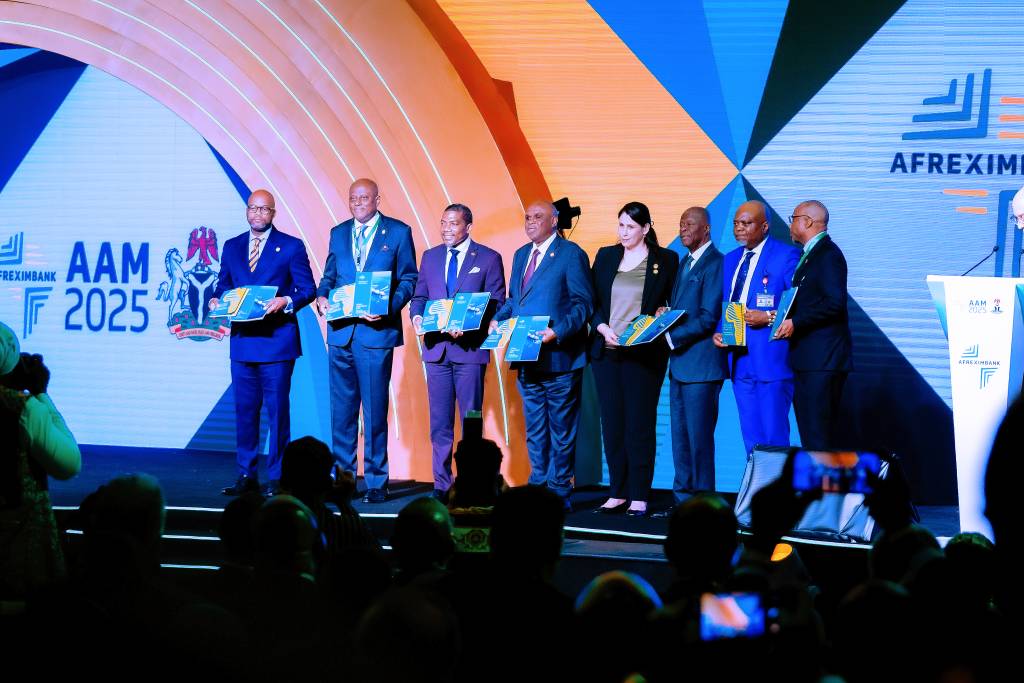
Afreximbank Unveils 2025 African Trade Report Amid Volatile Global Landscape
Afreximbank began the week with the launch of its flagship African Trade Report 2025, themed “African Trade in a Changing Global Financial Architecture,” which offers a critical analysis of Africa’s trade performance against the backdrop of mounting global uncertainty, while highlighting key opportunities for industrialisation, enhanced financial autonomy, and AfCFTA-driven integration. Underlining the continent’s potential, the report calls for Africa to convert external challenges into catalysts for deeper economic resilience and regional integration.
Speaking at the launch, Afreximbank President Prof. Benedict Oramah stated: “This year’s report provides a compelling roadmap for Africa to reposition itself within an increasingly volatile global economy. From strengthening trade finance systems to accelerating the AfCFTA, the message is clear: Africa must transform global fragmentation into an opportunity for industrialisation, digital advancement, and greater control over its financial architecture.”
Dr. Yemi Kale, Group Chief Economist at Afreximbank, highlighted a robust recovery in intra-African trade, emphasizing that the continent’s resilience is beginning to bear fruit, noting that recent growth figures reflect the early impact of regional integration efforts: “Despite global headwinds, Africa’s trade rebounded strongly in 2024, with trade between African countries increasing by 12.4% to US$220.3 billion—reversing a 5.9% contraction in 2023. This underscores the tangible benefits of AfCFTA implementation across the continent.”
The report calls on African governments to scale up access to trade finance—bridging an estimated $100 billion gap—and to deepen intra-African trade beyond commodities. Beyond presenting trade data, it highlights transformative initiatives such as the Pan-African Payment and Settlement System (PAPSS), advocates for practical regulatory harmonisation, and underscores the importance of mobilising institutional capital, including pension funds and sovereign wealth funds.
With Africa’s new seat at the G20 table, the report urges the continent to advocate for long-overdue reforms to the international financial system—including improved access to climate finance and credit rating methodologies that more accurately reflect Africa’s economic fundamentals. Against this backdrop, Afreximbank’s disbursement of over US$17.5 billion in 2024, with a target of US$40 billion by 2026, underscores its commitment to delivering a bold, actionable framework for advancing Africa’s economic sovereignty.
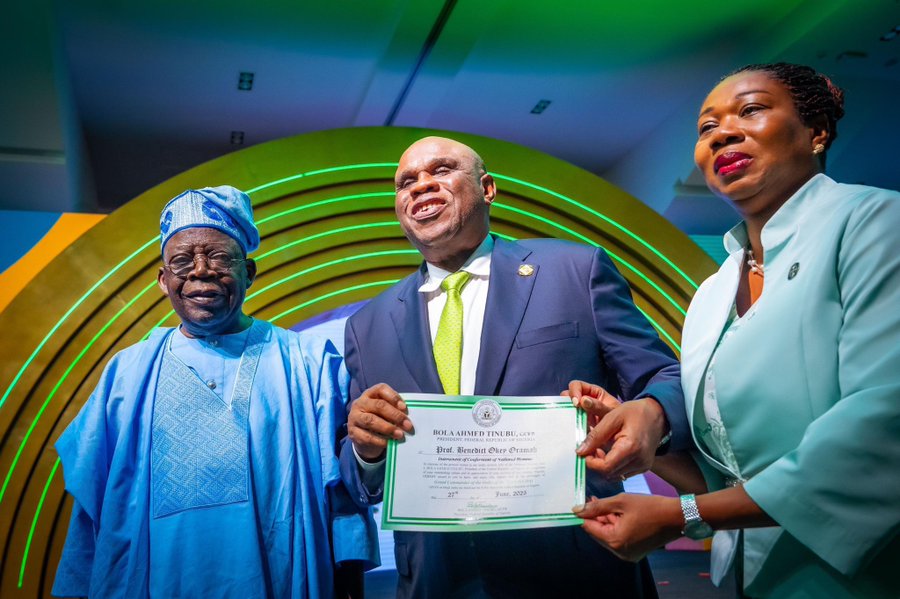
President Tinubu Confers GCON on Oramah
One of the most defining moments of AAM2025 came when Nigerian President Bola Ahmed Tinubu conferred the country’s second-highest national honour—the Grand Commander of the Order of the Niger (GCON)—upon Prof. Benedict Oramah, the outgoing President of Afreximbank and a proud Nigerian.
President Tinubu said the prestigious honour recognised Oramah’s decade of transformative leadership and Afreximbank’s exceptional contribution to Africa’s economic development and integration. “Afreximbank’s 32-year journey stands as the clearest expression of Africa’s resolve to own its development. Under your decade of transformative leadership, the Bank has become our trusted shield against economic shocks and Africa’s foremost trade finance institution.”
The Nigerian President noted that under Oramah’s stewardship, Afreximbank’s assets grew from $5 billion to over $37 billion, with more than $250 billion mobilised to support trade and development across Africa—of which $52 billion was directed to Nigeria. “This capital represented far more than financial transactions; it was a strategic investment in Africa’s sovereignty. Nigeria alone received US$52 billion in vital support spanning energy, agriculture, healthcare, and industrial projects.”
Highlighting Afreximbank’s landmark contributions, President Tinubu cited the Dangote Refinery project as a pivotal step toward fuel independence and the 500-bed African Medical Centre of Excellence (AMCE) as a major milestone in reducing medical tourism outside of the continent. He also praised the Pan-African Payment and Settlement System (PAPSS) for facilitating intra-African trade using local currencies and urged its wider adoption across the continent.
The Nigerian President also noted that Afreximbank’s support was instrumental to Nigeria’s ongoing economic reforms, including the removal of fuel subsidies and exchange rate unification, naming other upcoming ambitious initiatives, including the African Energy Bank (AEB), the Afreximbank Africa Trade Centre (AATC), and scaling fertiliser output to 7.5 million tons annually. “Embrace PAPSS—deeper financial integration fortifies the continent against global volatility.”
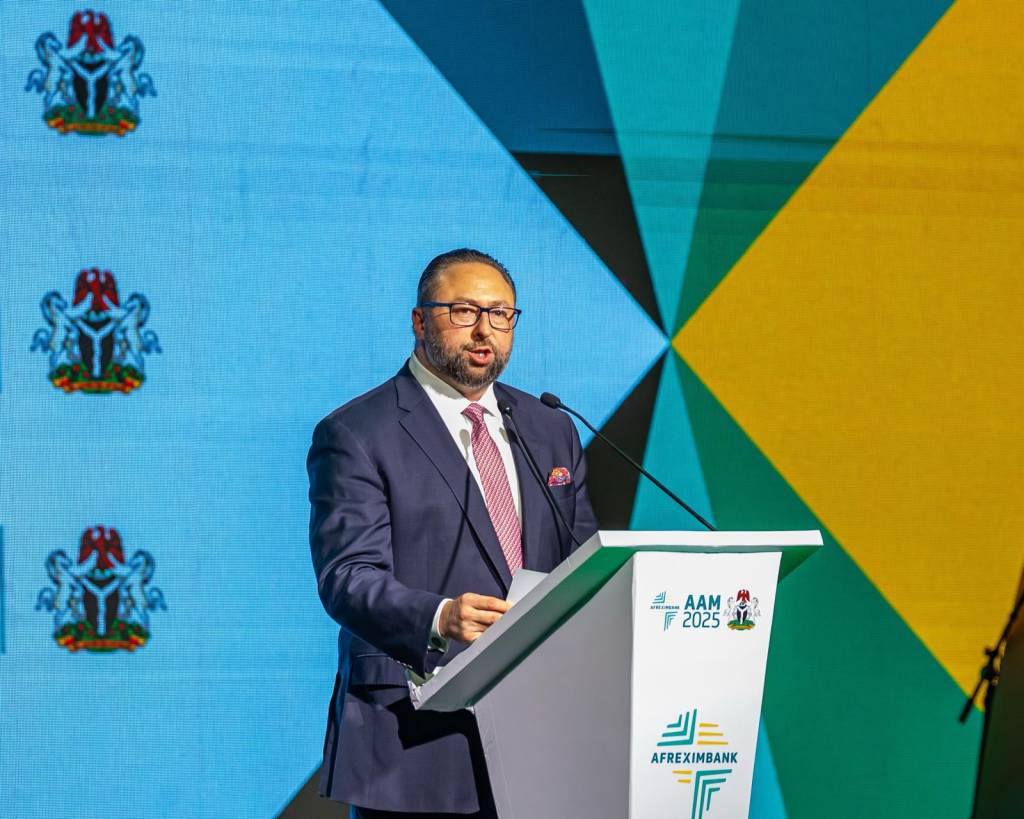
Jason Miller Outlines U.S.–Africa Trade Reset Rooted in Partnerships
In a candid keynote at AAM 2025, Jason Miller—former senior advisor and communications strategist to U.S. President Donald Trump—offered an American perspective on trade with Africa, promoting a new vision of “partnerships over promises.” He asserted that while Africa’s rise is inevitable, its long-term success hinges on rejecting exploitative arrangements in favour of direct, private-sector-led investment. His remarks challenged African leaders to rethink and reframe their global engagements through a lens of mutual benefit and strategic autonomy.
“This is Africa’s century. But if these opportunities aren’t seized strategically, Africa risks being taken advantage of again. America’s approach is for strategic partnerships anchored in private capital; not debt traps, military occupations, or hollow rhetoric. Partnerships should prioritise foreign direct investment in future-proof infrastructure: roads, ports, data centres, and clean energy,” Miller declared.
Miller urged African nations to demand tangible returns from international engagements, move away from unsustainable aid models, and accelerate reforms in business governance, legal enforcement, and transparency. He emphasized the importance of building direct ties with global capital pools—such as U.S. pension funds—as a pathway to unlocking large-scale investment. “The price of admission is clear rules and enforceable contracts—because that’s what unlocks a trillion-dollar wall of capital.”
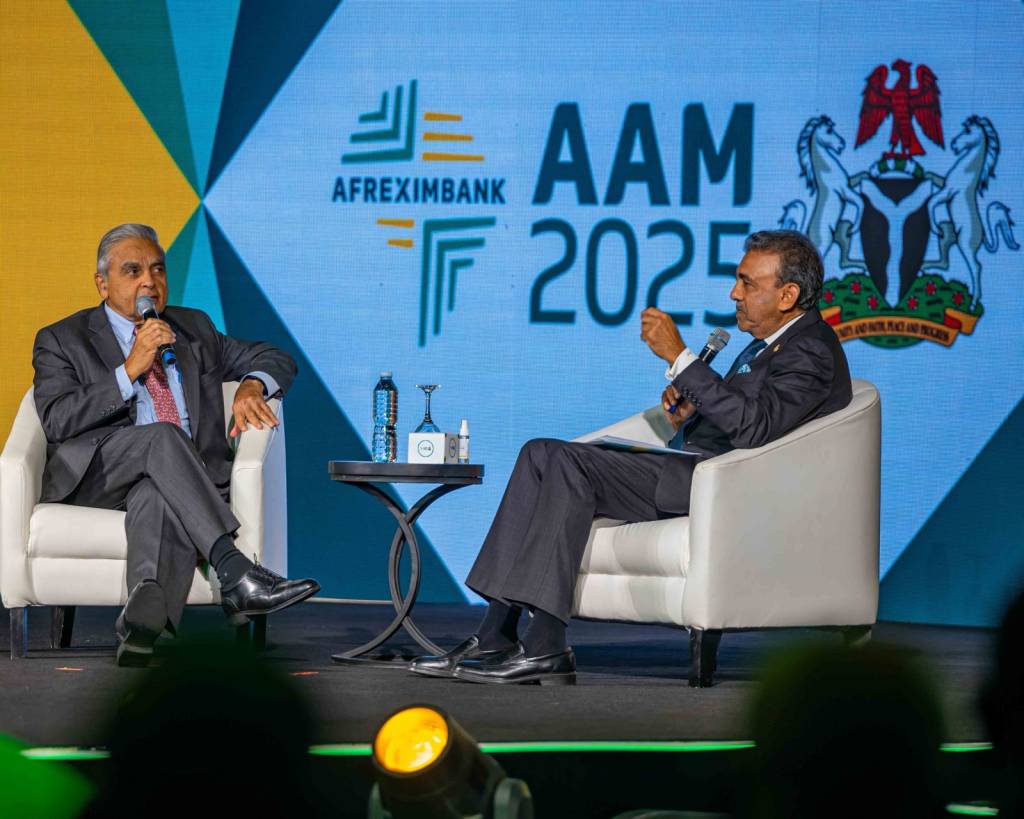
Sachs, Mahbubani Challenge Africa to Rewire Global Finance Rules
Day 3 of AAM2025 featured a thought-provoking session where renowned economist Prof. Jeffrey Sachs and former Singaporean diplomat Dr. Kishore Mahbubani challenged long-standing assumptions about Africa’s development trajectory—addressing its debt, sovereignty, and integration strategy. Prof. Sachs opened with a bold declaration: “There are three places with 1.5 billion people—China, India, and Africa. China’s turn lasted 40 years. India’s turn is now. Africa’s turn starts today.”
Sachs also emphasized the urgency of reforming the structurally biased global credit rating system, which denies Africa fair access to capital and systematically undervalues its economic potential, noting: “Africa receives only a trickle of the $30 trillion the world saves each year. Sometimes, the flows are even negative. Credit rating agencies apply sophisticated tools to assess corporations, yet they use crude, one-size-fits-all methods for African sovereign debt, creating an unfair imbalance that blocks the continent’s access to capital.”
Both speakers averred: Africa must build financial systems that reflect its potential, not its past. Drawing on Asia’s economic transformation, Dr. Kishore Mahbubani emphasised the critical role of pragmatic governance in driving sustainable development. He argued that Africa’s path to prosperity must be rooted in institutional trust, contractual integrity, and disciplined implementation of reforms. “Development is extremely difficult. Start small. Celebrate small wins. Institutional trust is built gradually.”
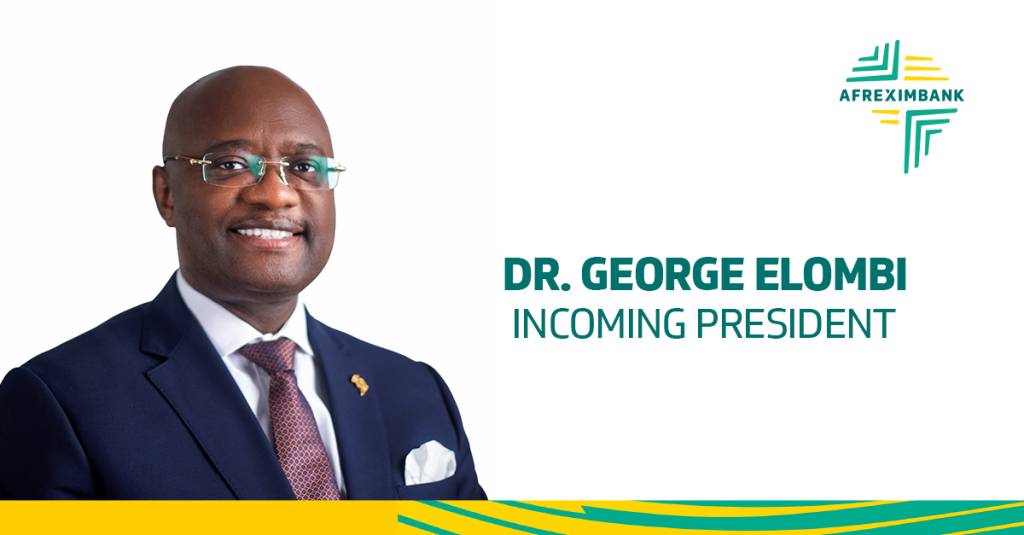
Afreximbank Appoints Dr. George Elombi as New President
Capping off the four-day gathering, Afreximbank’s shareholders announced the appointment of Dr. George Elombi as the Bank’s new President and Chairman of the Board of Directors. A seasoned executive with over 28 years of service at the institution, Dr. Elombi becomes Afreximbank’s fourth President and is set to formally assume office in September 2025.
In his acceptance speech, Dr. George Elombi reflected on his nearly three-decade journey at Afreximbank, pledging to lead with continuity, ambition, and renewed purpose. “I have worked alongside remarkable colleagues and extraordinary leaders to help shape this institution’s vision, its mandate, and its growth. As we look to the future, I see Afreximbank as a force for industrialising Africa and for restoring the dignity of Africans—wherever they may be. I will work to preserve this important asset.”
A Cameroonian national, Dr. Elombi, most recently served as Executive Vice President for Governance, Legal, and Corporate Services at Afreximbank. He previously chaired the Bank’s Emergency Response Committee, where he mobilised over US$2 billion for vaccine deployment during the COVID-19 pandemic, and led equity mobilisation efforts totalling more than US$3.6 billion. Dr. Elombi also endorsed his predecessor’s bold vision of transforming Afreximbank into a US$250 billion institution over the next decade.
The 32nd Afreximbank Annual Meetings in Abuja were far more than ceremonial—they were strategic. From cutting-edge trade insights and influential keynote speeches to significant policy shifts and leadership transitions, the event reaffirmed Afreximbank’s central role in shaping Africa’s economic trajectory. With renewed leadership, deepened partnerships, and ambitious plans, the Bank is positioning Africa not just to weather global financial headwinds—but to lead in global trade.

